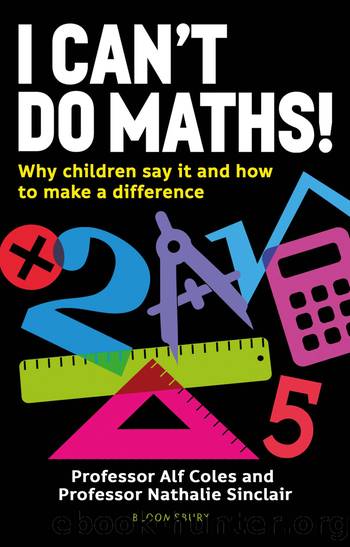I Can't Do Maths! by Professor Alf Coles

Author:Professor Alf Coles
Language: eng
Format: epub
Publisher: Bloomsbury Publishing
On cultural impositions
Maths certainly delights some people, and we certainly hope that children can experience such delight in the classroom, just as they might when reading a book or engaging with a piece of visual art. But if weâre going to recognise the cultural aspects of maths, then we also must acknowledge the negative effects some of these can lead to. We mentioned one above, in relation to Valerie Walkerdineâs idea of symbolic violence, when students feel literally hit over the head by alienating and debilitating mathematical objects. When formulas are created and used without adequate attention to the context in which theyâll be applied, they can cause much harm, as Cathy OâNeil shows in her book Weapons of Math Destruction (OâNeil, 2016). She shows how the algorithms used to determine which adverts you see on the internet or which products will be recommended to you when you shop online can adversely affect marginalised people. You could argue that itâs not the maths itself thatâs to blame, but the way itâs used. However, when following mathematical values, the aim is to produce equations and relations that are universal and unbiased, but it is this very value that ends up making maths blind to social concerns.
In this light, teaching maths involves an important responsibility, not just to provide pupils with tools theyâll need in future, but also to help them understand the limits of these tools. This can be done with a wide variety of mathematical concepts. In teaching division, for example, the mathematical operation involves equal partitioning. So, we can split a set of goods into equal parts. But in some cases, we might want to distribute goods in a way that aligns with goals of equity rather than equality. How might we think of division if we want to distribute goods to people who have varying levels of wealth or property, for example? Another example might be asking why wage increases are always given in percentage terms, and what effect this has on wage disparity, compared with fixed sum increases â percentages are mathematically powerful because they provide a common measure through which to compare, but they can also hide significant details.
Similarly, there are some ways of thinking in maths that prioritise some kinds of understanding above others. For example, the value of objectiveness tends to lead to ways of talking that features the use of nouns over verbs. Nouns are less apt to betray a sense of action. We talk about the sum of two numbers rather than saying that we add one number to another. With a verb, there has to be a person involved in the action, and that in turn implies some subjectivity. In cultures where objectiveness is less valued, maths talk involves more verbs. For example, in the Miâkmaw people of eastern Canada, the word for straight is pekaq, which translates as âit goes straightâ (Lunney Borden, 2011). Instead of thinking of a line as fixed and static, the Miâkmaw line involves movement from one end to another.
Download
This site does not store any files on its server. We only index and link to content provided by other sites. Please contact the content providers to delete copyright contents if any and email us, we'll remove relevant links or contents immediately.
Deep learning with TensorFlow and Keras by Derrick mwiti(902)
Understanding PDA Autism in Kids: A Guide for Parents and Teachers to Support Neurodiverse Learners by Jehu Len(837)
The Victorian Era: A Captivating Guide to the Life of Queen Victoria and an Era in the History of the United Kingdom Known for Its Hierarchy-Based Social Order by Captivating History(613)
Writing Solid Code: Development Philosophies for Writing Bug-Free Programs by Steve Maguire(534)
100 Ideas for Secondary Teachers: Engaging Parents by Janet Goodall & Kathryn Weston(511)
Intersectionality in Educational Research by Dannielle Joy Davis; James L. Olive; Rachelle J. Brunn-Bevel; Susan R. Jones(506)
How to be assertive in any situation by Hadfield Sue & Hasson Gill(500)
Brain Teasers to Build Critical Thinking Skills: Brain Exercises for Tech, Banking, Case Interview Prep, and to Keep Your Mind Sharp by Kris Safarova(487)
Brain Teasers to Build Critical Thinking Skills by Safarova Kris(483)
Python 101 - Fundamentals by Sam(452)
Critical Curriculum Leadership : A Framework for Progressive Education by Rose M. Ylimaki(445)
The Art of Emotional Validation: Improve Your Communication Skills and Transform Your Relationships by Validating Emotions and Feelings by Emily Wright(414)
A Beginner's Guide to SSD Firmware by Unknown(401)
The Knights Templar: An Enthralling History of the Rise and Fall of the Most Influential Catholic Military Order by Wellman Billy(400)
NumPy : From Basic to Advance by bisht Karan Singh(399)
Alma Maters (5th edition) by Unknown(390)
The Future Knowledge Compendium by Ellyard Peter;(389)
What Every Teacher Should Know about Learning, Memory, and the Brain by Tileston Donna E. Walker;(386)
Make wealth from intraday trading by Maddy MADDY(377)
